May 2025
How to Use SearchGPT to Research Different Types of Water Filters
Key Takeaways
- SearchGPT is a search engine built into ChatGPT that uses artificial intelligence (AI) and natural language processing (NLP) to answer your questions.
- You can use SearchGPT to research different types of water filters by asking it about water quality considerations in your area.
- SearchGPT will recommend suitable water filters for your location, and you can ask follow-up questions to learn more about different types of water filters
- Always verify the information against a trusted source, such as your local water quality report from HomeWater.
Water filters don’t just improve the taste of your water. They can also remove harmful contaminants such as lead, forever chemicals, and disinfection byproducts. But some types of water filters are more effective at removing contaminants than others, and it can take a lot of research to figure out which is which.
If you need help, AI tools like SearchGPT can point you in the right direction and give you the information you need to make an informed decision for yourself.
Here’s how to use SearchGPT to research different types of water filters and choose one based on the specific water quality issues in your area.
What Is SearchGPT?
SearchGPT is an AI search tool developed by OpenAI, an AI startup company that’s partially owned by Microsoft. It uses a large language model (LLM) called GPT-4, a machine learning algorithm that allows it to respond to questions in real time.
SearchGPT has the same interface as ChatGPT — a generative AI chatbot — but it has additional functionality. Unlike ChatGPT, which can provide answers to questions but doesn’t cite its sources, SearchGPT tells you where it got the information from, such as Wikipedia, so you can click on the link and confirm the relevant information.
In that sense, the user experience is a bit like using Bing or Google Search. You’ll get an AI-powered summary, with citations, in response to your search query, instead of just a text-based response like you would with a ChatGPT conversation.
Is It Free to Use SearchGPT?
Yes, it’s free to use SearchGPT. Originally, SearchGPT was only rolled out to paying subscribers, but now it’s open to anyone with a ChatGPT account.
To use it, you’ll need to select the Globe icon when messaging ChatGPT; otherwise, it won’t do a web search and will generate a response based on its training data rather than the entire internet.
SearchGPT has a freemium business model, which means that paid subscribers get access to more features, such as advanced voice mode, but you don’t need to pay anything to use SearchGPT to research different types of water filters.
Is SearchGPT Accurate?
Since SearchGPT can look up information on the internet, it’s more accurate than AI models that rely entirely on datasets, which can be limited and out-of-date. However, OpenAI warns users that “ChatGPT can make mistakes. Check important info.”
If you’re using SearchGPT to research different types of water filters, it’s important to find out where the information is coming from and make sure it’s a reliable source.
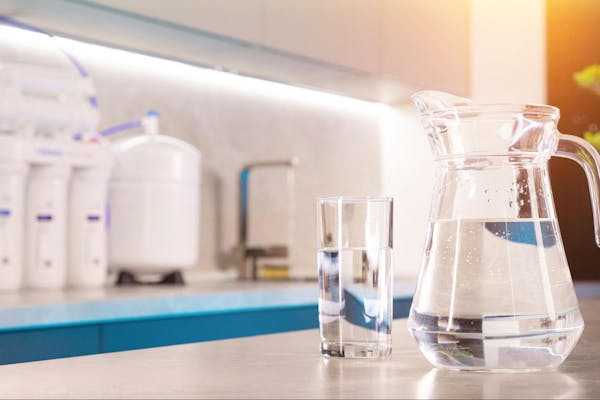
How to Use SearchGPT to Find Your Local Water Quality
Before you research different types of water filters, you may want to learn how to use SearchGPT to determine the condition of your city’s water. After all, the most effective home water filter for you will depend on what you want to remove from your water.
For example, if you want to learn about water quality in Los Angeles, California, you can ask SearchGPT:

As you can see, although LA’s drinking water “meets or exceeds all federal and state quality standards,” it has high levels of contaminants like arsenic and chromium.
If SearchGPT can’t find enough information about your city’s water quality, enter your ZIP code here to get your local water quality report.
How to Use SearchGPT to Research Different Types of Water Filters
Now that you know a bit about your city’s water quality, you can ask SearchGPT to research different types of water filters for you. Here’s an example:
In this case, SearchGPT provides a list of several different types of water filters, and explains what they remove, their suitability for your region, and some examples.

Another way to ask the question is by listing the contaminants you want to remove, such as lead, volatile organic compounds (VOCs), and chlorine. SearchGPT will provide a list of filters that meet your criteria:
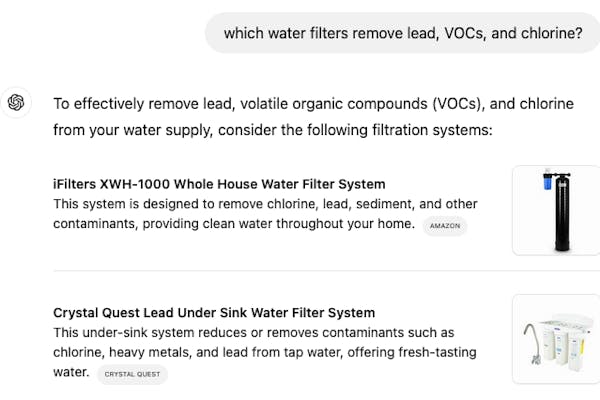
What Criteria Can SearchGPT Use to Find the Right Water Filter for My Needs?
What if SearchGPT can’t find the right type of water filter? You can use more detailed questions to fine-tune your search results, such as: “Which water filters remove lead, VOCs, and chlorine, fit under the counter, and cost less than $300?”
If you have a private well, you can ask which water filters are best for well water, or where you can go to test your tap water for specific contaminants:
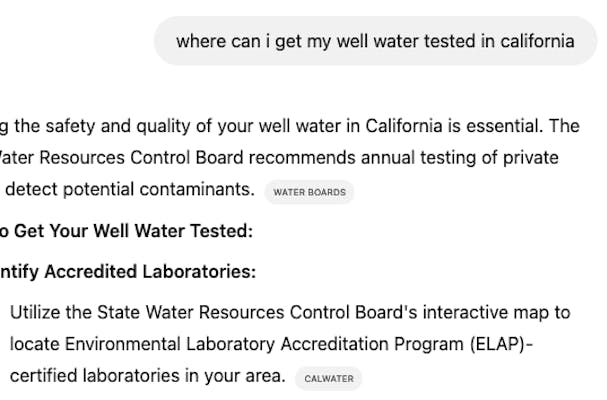
Another idea is to ask SearchGPT how often you’ll need to change your water filter based on your household size:
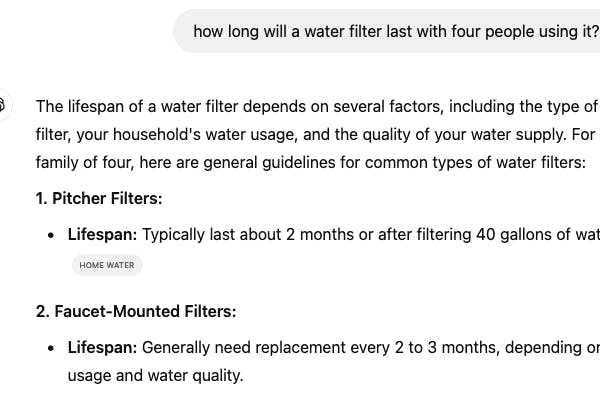
In this case, SearchGPT informs you that you need to replace a pitcher filter every two months and faucet filters every two to three months. You can click the citation to learn more about water filter pitchers and whether or not they’re right for you.

Can You Use SearchGPT to Compare Different Water Filtration Technologies?
SearchGPT can help you compare different water filtration technologies that you want to research, like reverse osmosis (RO), ultraviolet (UV), and activated carbon. In fact, you can ask it to create a chart so it’s easy to compare your options side-by-side:
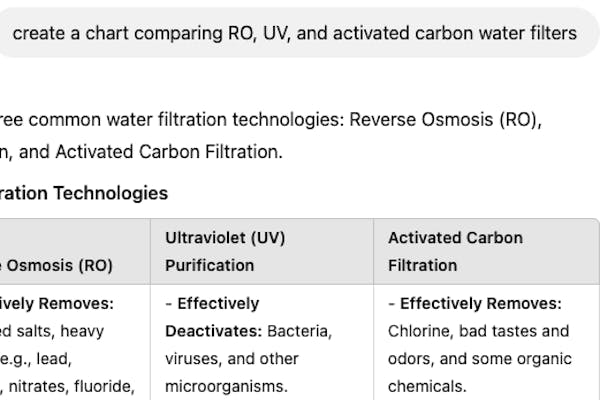
Water filters are categorized by their NSF/ANSI rating, which tells consumers which types of contaminants they’re certified to remove. For example, a water filter with an NSF/ANSI rating of 53 is certified to remove contaminants like lead and asbestos, which can have major health effects.
If you have hard water, you can use SearchGPT to research different types of water softeners, which remove minerals like calcium and magnesium.
Can SearchGPT Provide Reviews or Ratings for Popular Water Filter Brands and Models?
SearchGPT can recommend products, but how do you know if they’re any good? One option is to ask SearchGPT to provide product reviews from trusted sources.
For example, you can ask it to show you water filter product reviews on Reddit, and it will recommend threads with relevant information:

SearchGPT can also point you in the direction of podcasts, Amazon reviews, and product recommendations from trusted websites like the New York Times.
Can SearchGPT Assist in Comparing Costs and Maintenance Requirements for Different Water Filters?
Water filters range from budget-friendly refrigerator water filters to whole home reverse osmosis systems that cost more money to install and maintain. SearchGPT can help you estimate your costs by breaking them down into installation costs, maintenance costs, filter replacement costs, and other ongoing expenses.
You can also ask it for ways to save money on water filters. It might recommend things such as a DIY installation, or reducing your water usage to extend your filter life.
When you buy an under-counter water filter from HomeWater, you can install it yourself in only 15 minutes. Plus, you’ll get 15% off of replacement filters when you purchase a subscription for filter replacements every 2, 6, or 12 months.
Can SearchGPT Find Water Filters for Specific Installation Types?
SearchGPT can help you choose between whole home, under-counter, and other types of water filters. It can even provide step-by-step instructions on how to install your filter or swap out a replacement filter.
Of course, since every water filter is different, it’s important to follow the manufacturer’s instructions. Still, it can help you figure out which filter types are compatible with your home, and whether you’ll need to hire a professional to install it for you.
What Resources Does SearchGPT Suggest for Learning About NSF/ANSI Certifications?
If you want to learn more about NSF/ANSI standards and what they mean, SearchGPT can point you in the right direction. It recommends visiting the NSF’s official website, reading educational articles, and reviewing some video resources.

However, it does get one piece of information wrong: NSF stands for NSF International (previously the National Sanitation Foundation). The National Science Foundation is a different organization. That’s why it’s always important to verify important facts.
What Are Some Alternatives to SearchGPT?
SearchGPT isn’t the only tool you can use to research water filters. Other AI-powered tools that fall roughly in the same category include Google Gemini, Microsoft Copilot, and Perplexity.AI. Some AI tools, such as Apple Intelligence, don’t include a search engine, and Apple says it doesn’t plan to develop one.
Another alternative is to use traditional search engines like Google or Bing. These tools rely on ad revenue and are heavily influenced by search engine optimization (SEO) — although many of them are increasingly providing AI summaries.
If you want to use SearchGPT, you can use it on the web, your iPhone, or your Android device, and ask questions in English or one of several other languages.

Can You Use SearchGPT to Research Different Types of Water Filters and Improve Your Water Quality?
Yes, you can use SearchGPT to research different types of water filters. It represents a major advancement over ChatGPT, which doesn’t provide links to external web pages or social media. You can use SearchGPT to create charts, write summarizations, and provide product recommendations for high-quality water filters.
With any AI search engine, double-check the information it gives you to make sure it’s accurate. After using SearchGPT to research different types of water filters, test your knowledge with our filter quiz and get 10% off your first order.